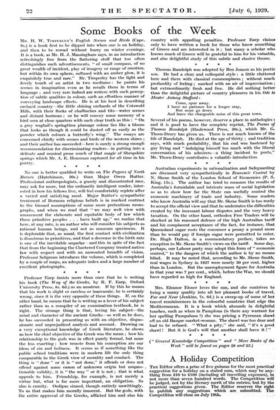Professor Earp insists more than once that he is writing
his book (The Way of the Greeks, by R. F. Earp, Oxford University Press, 8s. 6d.) as an amateur. If by this he means that his work is slight or careless or inaccurate, he is certainly wrong, since it is the very opposite of these things. If, on the other hand, he means that he is writing as a lover of his subject rather than as a compiler of an examination textbook, he is right. The strange thing is that, loving his subject—the mind and character of the ancient Greeks—so well as he does, he has succeeded in presenting us with an objective, dispas- sionate and unprejudiced analysis and account. Drawing on a very exceptional knowledge of Greek literature, he shows us how the chief objective of the Greek was the mean ; how his relationship to the gods was in effect purely formal, but none the less exacting ; how remote from his conception are our ideas of sin and holiness. It seems as if something like the public school traditions were in modern life the only thing comparable to the Greek view of morality and conduct. The thing is "done" or it is "not done," it offends or does not offend against some canon of unknown origin but unques- tionable validity, it is "the way" or it is not ; that is what appeals to him. Friendship, for example, is not merely a virtue but, what is far more important, an obligation. So also is enmity. Oedipus sinned, though entirely unwittingly. To us that makes him morally innocent. But the gods, with the entire approval of the Greeks, afflicted him and also his country with appalling penalties. Professor Earp claims only to have written a book for those who know something of Greece and are interested in it ; but many a scholar who knows much of Greece will be grateful to him for his valuable, and also delightful study of this subtle and elusive theme.










































 Previous page
Previous page